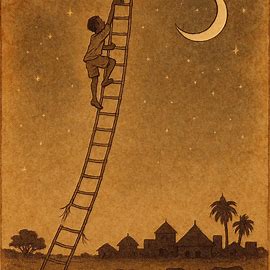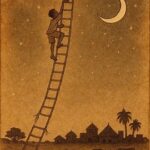Once, in a quiet Angolan village, a woman bore her children and raised them with love. Their father passed away too soon, leaving her to guide them through life. The children grew, and the two eldest sons reached the age where they longed to prove themselves. The elder declared, “I will learn the craft of hunting.” His younger brother agreed, “I too will learn the hunter’s ways.” They took up their guns and set out into the deep forests, determined to return with game worthy of their late father’s memory.
They searched the woods but found no animals. Dark clouds gathered, and rain poured down in heavy sheets. “Let us flee from the storm,” they cried. Running through the dripping trees, they came upon a house. Seeking shelter, they entered, and discovered it belonged to the Ma-kishi, the fearsome forest spirits. Inside, they found a mbanza (a musical instrument) and began to play, perhaps to steady their nerves.
Soon, one Di-kishi returned carrying two buffaloes. Hearing the music, he demanded, “Who dares play my mbanza?” A voice within answered boldly, “If you are strong, enter! You shall become food for my dogs!” The spirit hesitated outside. Another Di-kishi came, bearing three buffaloes, and asked his companion, “Why do you linger?” The first replied, “Inside are two men who wish to kill us and feed us to their dogs.”
One by one, more Ma-kishi arrived, until their chief himself appeared. He asked his followers why they waited, and they too answered, “We fear the two men inside.” Angered, the chief entered and commanded the brothers, “Go outside!” The hunters replied, “We will not.” The chief ordered his spirits, “Drag them out!” And so, they were cast into the open.
READ THIS: The Girls and the Ma-Kishi: An Angolan Folktale of Wisdom, Vigilance, and Courage
The elder brother sat calmly, while the younger leapt into battle. With ferocity, he slew four of the spirits. Eight remained. He fought again, killing four more, and at last sat beside his brother to rest. Then the elder rose, and with equal strength defeated the last four, before facing the Ma-kishi chief. He struck the chief, cutting off his head. Yet another head grew in its place. Again, he cut it down, but still a new one appeared. Exhausted, the elder sighed, “We cannot kill him. Let us sit.”
In that moment, the elder transformed into a great bagre-fish. The chief seized him and swallowed him whole. But inside the spirit’s belly, the bagre searched through its heart, looking for the keys to its house. Finding them, he carried them out. The younger brother struck then, cutting off the chief’s head once more. This time the spirit fell lifeless.
With the keys, the brothers opened the house. In the lower rooms they found captives, starving slaves. They fed them and restored their strength. In the upper rooms they discovered three noble ladies, whom they also nourished. Together they said, “We shall live here now, in safety and honour.”
Meanwhile, their widowed mother had left for another land with her two younger children. Times were hard, and she often complained, “The food we eat is not enough. Go fetch firewood.” The children obeyed, but as they wandered, they lost their way and came to the hut of a strange old woman. She greeted them warmly, saying, “You are my children now. Go and fetch me firewood.” They cut wood and returned. She fed them, let them sleep, and the next day sent them again.
While gathering wood, the elder boy lingered. There before him appeared his deceased father, who asked gently, “Why do you cut firewood, my son?” The boy replied, “I do not know, Father.” His father said, “When they send you for water, return to me, and I will tell you what to do.”
Later, the old woman sent the children to fetch water. The younger obeyed and brought water back, but the elder remained. Again, his father appeared and instructed him: “When the woman sets the water to boil and asks you to see if it boils, say, ‘I do not know.’ When she leans over to look, push her into the pot and hold her there.”
The boy did as told. When the woman bent over the steaming pot, he thrust her in and held her down until she perished. He and his sister searched the hut, where they found great riches hidden away. Taking the treasure, they fled and returned to their mother, bringing her relief and joy after long hardship.
Thus ended the trials of the widow’s children.
Moral of the Story
This tale reminds us that bravery and vigilance, joined with wisdom, can defeat even the greatest dangers. The brothers’ courage against the Ma-kishi saved many lives, while the younger children’s obedience to their father’s spirit freed them from deceit. Together, these lessons show that strength alone is not enough, patience, guidance, and truth must walk beside it.
Knowledge Check
1. Who were the Ma-kishi in the story?
They were powerful forest spirits feared by humans.
2. What form did the elder brother take to defeat the Ma-kishi chief?
He transformed into a bagre-fish to find the keys hidden inside the spirit.
3. What did the brothers find inside the Ma-kishi’s house?
They discovered starving slaves and three noble ladies, whom they fed and freed.
4. How did the deceased father help the younger children?
He appeared to his son and revealed how to defeat the deceitful old woman.
5. What lesson does the story highlight about strength?
That strength alone is not enough; wisdom, vigilance, and truth ensure victory.
6. What is the cultural origin of this tale?
It is a traditional folktale of the Kimbundu people of Angola.
Source: Traditional Kimbundu folktale, Angola.







